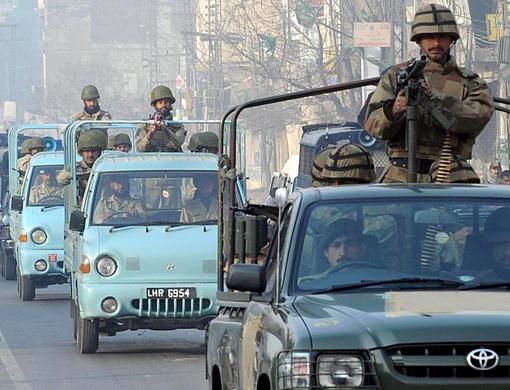Islamabad: Pakistan vowed on Sunday to hold parliamentary elections despite Saturday's suicide attack on a campaign rally that killed 47 people, rattling voters already wary of the militant violence that has overshadowed the Islamic nation's next step toward democracy.
The government is under pressure from its Western allies to hold a free and fair vote in Monday's elections.
The result of the polls will be critical for the political future of US-backed President Pervez Musharraf and a country grappling with rising attacks by pro-Taliban militants.
The suicide car bombing on Saturday night attacked a rally for an independent candidate supported by the party of slain opposition leader Benazir Bhutto in the northwestern town of Parachinar, near the Afghan border. Authorities immediately imposed a round-the-clock curfew.
Parachinar security official Mushtaq Hussain said 47 were killed and 110 wounded in the attack.
Musharraf, who seized power in a 1999 coup, told the state-run Associated Press of Pakistan that the election would go ahead as planned, saying "any effort to derail the democratic process or the holding of elections will be foiled".
The retired army general, a key ally in the US-led war on terrorism, faces rising public anger following decisions late last year to declare emergency rule, purge the judiciary and curb independent media.
Vulnerable
Although Musharraf's own position as president is not being contested in the vote, an unfavourable outcome could leave him politically vulnerable, even at risk of impeachment.
Musharraf's political allies in the Pakistan Muslim League-Q party are faring badly in opinion polls, trailing behind Bhutto's Pakistan Peoples Party - which is forecast to win - and the opposition party of another former prime minister Nawaz Sharif.
The result is far from a foregone conclusion, however. The PML-Q predicts it will fare strongly in rural areas of the largest province, Punjab, where the election is likely to be lost or won.
The Sharif and Bhutto camps claim the vote is being rigged against them.
"This is not going to be a free and fair election," said PPP spokeswoman Sherry Rehman.
"We have improvised polling stations coming up in the last few days. We have firing on our rallies." She also mentioned bomb blasts occurring "very suspiciously" during party processions.
On the eve of the voting, Information Minister Nisar Memon promised fair elections and tight security to ensure they are peaceful. "If anyone tries to create a law and order situation, he will be dealt with sternly," Memon told reporters.
President Pervez Musharraf said he would act as a "father figure" to the country's new prime minister, in an interview with Imran Khan's ex-wife published yesterday on the eve of elections.
He also told Jemima Khan, who split from the cricket hero-turned-opposition politician in 2004, that the Pakistan Muslim League-Quaid (PML-Q) party which supports him would "certainly have the majority" after today's vote.
But he questioned whether it could form a government. "My role as a president is simply the checks and balances, the seatbelts... a sort of father figure to the prime minister, but I won't have to see him for weeks," Musharraf said, in comments reported by Britain's Independent on Sunday newspaper.
While predicting a majority for PML-Q, allied with the Muttahida Qaumi Movement, Musharraf added: "Whether they'll be able to form a government is a question mark."
He also described sacked chief justice Iftikhar Mohammad Chaudhry as "the scum of the earth - a third-rate man - a corrupt man" in remarks quoted by the paper.
And he agreed that Bhutto and widower Asif Ali Zardari, now leader of the Pakistan Peoples Party, should not have been granted immunity from corruption charges last year, the newspaper said.
In separate BBC interviews broadcast in Britain yesterday, Imran Khan - whose party is boycotting the elections - and Nawaz Sharif, the former premier who leads the PML-N party, both predicted the votes will be fixed.













